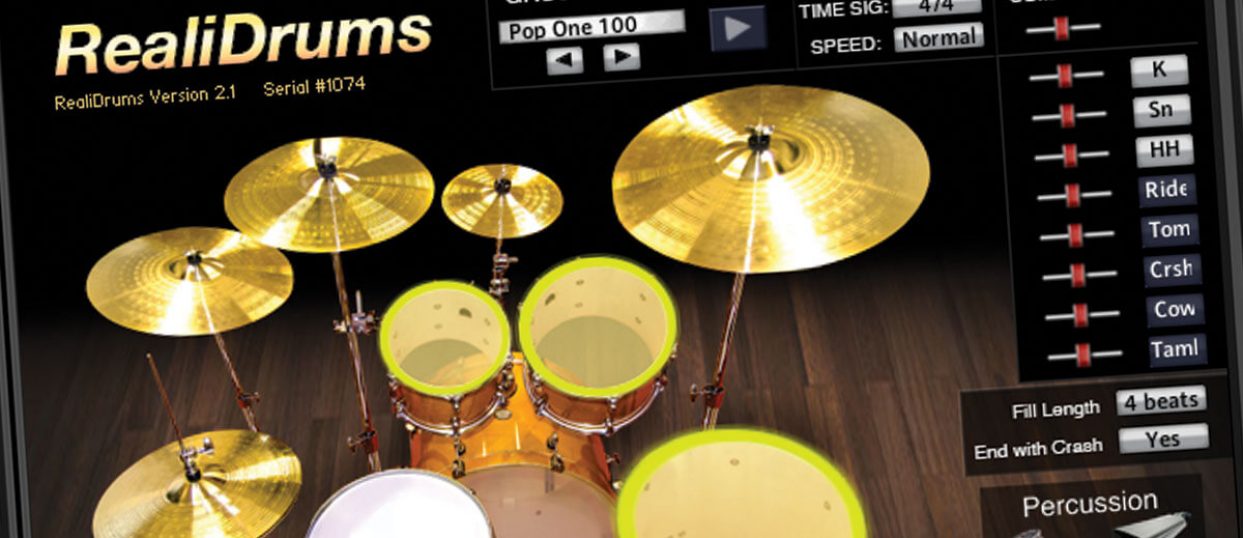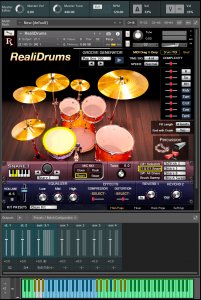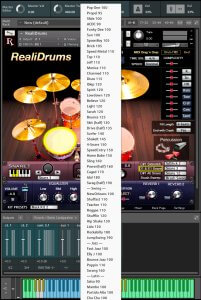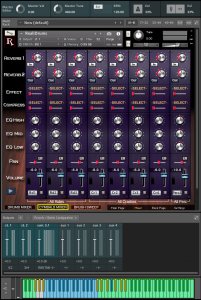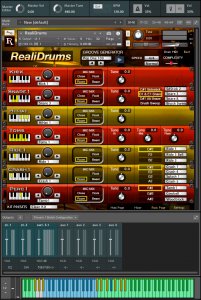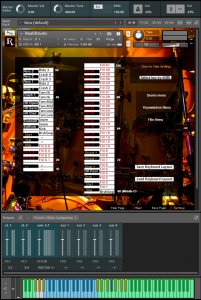RealiTone RealiDrums – left of leftfield
Great software doesn’t need to be totally groundbreaking to be innovative. RealiTone offers familiar functionality with some exciting new features in this drum library songwriters are going to flip over. Let’s get rolling with our full review of RealiDrums.
In a saturated market, a boutique software developer would need to come up with something really special to outshine the competition. It seems RealiTone just might have something truly unique and well worth considering if you’re in the market for such songwriting software.
RealiDrums is a Native Instruments Kontakt library and on the surface looks a fairly typical affair. It features a mostly intuitive interface with a large drum kit graphic in the middle, various sliders, knobs and buttons placed around within easy reach, and all of the standard Kontakt interface controls as you’d expect. There are two rack devices on the bottom quarter of the screen providing control over whatever individual elements of the kit you have selected, the first showing performance controls, the second mixer controls. Somewhat harder to see is the tab buttons under that leading to expanded views of the full mixer, rack and setting pages.
The interface looks quite dated but functional enough with intuitive controls and simple navigation. RealiTone founder Mike Greene has produced a number of videos on YouTube explaining the core workings, so you’ll unlikely need to read the manual. All of the controls are MIDI mappable, and the key group articulations locations are customisable, great stuff. On the settings page, you’ll find individual output controls for each of the drum elements, velocity settings and global reverb controls.
Included in v2.1 is the new MIDI sync option that allows you to control other drum software directly with RealiDrum’s groove generator, though this disables RealiDrum’s internal sounds unfortunately. It’s a neat feature that allows you to use your existing software in conjunction.
From right out of the box it’s obvious RealiDrums is a unique instrument with a different core workflow than what you might be used to.
Firstly, RealiDrums only comes with one drum kit – technically. The difference being you swap out elements of the kit to your liking. So, for instance, if you don’t like the snare simply swap out a new one. You construct a perfect kit by changing individual elements, not complete kits. This is nothing new for drum software, the notable difference is all of the extra elements are included with RealiDrums, not a DLC expansion. Included are 42 snares, 7 kicks, 11 hit hats, 24 rides, 33 crashes and a bunch of percussive extras (including cowbell – yus!) Each of the elements includes 4 alternative room mic recordings, all of them being unique recordings.
Each element is hot-swappable on the fly while preserving the overall mix of the kit and any tuning, panning or processing you have done for that previous element. It’s a nice touch, allowing you to dial through different elements of the kit as it plays without having to totally remix each as you go. All of the included elements are in keeping with each other, so you’re not going to find random electronic or oddball samples.
You are able to output each element separately to your DAW if you wish for further editing, though the sandbox-style design means you can do all of your mixing and processing directly in the plugin. There is basic eq, compression and reverb included from the venerable Kontakt collection.
The included room mics offer 4 alternative states, from dry through to ‘Beast’, a very John Bonham-style parallel compression sound that was all the rage a few years back. The tune controls work better than most, in that it seems to pitch the element in relation to the kit, not just some arbitrary amount. Tuning a drum actually sounds quite realistic.
Getting Into The Groove
For me, RealiDrums’ big party trick is the clever groove generator ‘complexity’ controls, a simple yet genius feature allowing you to easily dial up MIDI performance alterations on the fly.
The premise is after you’ve selected a basic kit sound, you then jump in and choose a groove as a starting point. Once the tempo and time signature have been set you should have something basic you can work with. From there you simply drag and drop grooves as you find them into your DAW sequence, either as beats (a 4-bar groove currently playing), fills or performances (everything you have done since you hit play). Complexity controls can be adjusted individually or all at once, plus you can bring in or remove elements as you need. Being able to drop full performances into your DAW is magic – for those times you stumble on gold and need to save it down, just a life-saver!
Using the complexity sliders for me was an extremely musical way of finding grooves. Often times you’ll stumble into some happy mistake that just works, much like I guess when working with a real human player. They’ll offer up grooves you might not have even thought of that just works and takes the song in a totally new direction. Even if you have a very specific groove in mind and the complexity controls don’t nail it perfectly, it’s no problem to drag and drop the close-enough sounding grooves into your DAW, then jump into the MIDI editor and adjust the performance to suit.
It’s a very good system for us non-drummers like me out there. This feels more like working with a real drummer, rather than your typical hit-and-miss approach to trolling through MIDI files and presets. The excellent selection of drum fills all work with the groove currently playing, so over time you’ll become familiar with, for instance, the fill on key C4. That fill will slightly adjust to match the groove and time signature, giving you the type of fill you want to match to the current groove you have. Very clever stuff.
After a few passes you’ll have a good selection of grooves in your DAW to construct a working drum track. It’s just a matter of fine-tuning and adding in any stray crashes fills and stops you need, and your drum groove is done.
I can’t believe how excited I am about this feature. I’ve been playing with it on a previously constructed song I’ve been working on for ages with another drum library that’s never really sat well in the groove. Either the bass was too busy or the drums sounded wrong. After about 10 minutes of mucking with RealiDrum grooves, I had two or three really cool ideas quite literally by mistake while playing with the complexity controls. I dragged the entire performance into the DAW and cut out the stuff I didn’t need, and presto – perfect.
And of course, since we’re talking about MIDI data here, you’re not left out in the dark without your old drum samples. I particularly like the more electronic sound from Toontrack No1 hits kicks, so it’s a snap to use the kicks I like with a RealiDrums mix by inserting it on the same MIDI channel.
Road Test
So while we’re on the subject of samples, how does it sound? I’m not one to get overly technical about drum recordings, I’ve been known to compare drumming to hammering up a garden shed sometimes. But when it comes to room placement, I’m a stickler for balance. I love room mics, panning, and sound staging. For me, the drums need to be centre place in a mix without stealing too much of the available frequency real estate from other important melodic instruments and vocals.
Out-of-the-box RealiDrums sound a little weak and slightly too lively for my tastes, though much of this is adjusted with the room mics. The built-in compressor and distortion effects are way too heavy-handed, plus they have no decent configuration controls. While the included kit presets offer a good selection of go-to mixes to get you going, I found much better results when routing the mixer outputs to my DAW and using quality 3rd party processing on the tracks.
RealiDrums is a rock kit predominantly, you’ll not find EDM-friendly techno kits or weirdo industry samples here. Though you can get a little crazy with distortion and compression effects, really you’ll want to be writing rock or pop songs here.
Kicks are mostly good, with noticeable saturation on a few when velocity gets over 100 or so. Snares are great, with plenty of tonal options to choose from. Toms sound nice, with individual tuning controls for each of the three available. There are 33 odd crashes, splashes and china crashes available between four positions on the kit. Each sound excellent. And finally, the percussion sound is very realistic, especially the cowbell oddly enough, something missing from most libraries we have.
All respond well to room mics mixes, though I wish there were mix controls available to dial back the room effect sometimes. Likewise, I wish there was a little more control over the snare top and bottom mics, just to bring in a little more snap or top end if required.
The included reverbs are quite frankly terrible and should be avoided – or at best, subtly added. This, however, is not a slight on RealiDrum, but the Kontakt in-house reverb has never sounded any good on anything I’ve used. Don’t confuse the in-house Kontakt reverb with the excellently recorded room mics, totally different effects.
So by default, RealiDrums isn’t overly hyped sounding, though interestingly it responds very well to 3rd party processing. Bypassing the included effects and using high-end EQ, compression and BUS won’t take long to achieve a decent mix, equally on par with EXD2 and BFD. A major difference with RealiDrum is the included kit elements sound balanced, no matter what combination you use. With EXD2, BFD and the others – the expansion kits all sound radically different when mixed and matched, and not as cohesive.
Conclusions
RealiDrums as a drum library sounds passable, with an excellent collection of snares, kicks and other elements to build a useful kit. But, where RealiDrums shines, is with its fantastic groove generator tools. A focus on creating patterns and fills that actually work well with your projects, while never feeling handicapped or restricted from layering in other drum software, it truly is the best of all worlds.
You don’t need to be a drummer to program drums anymore, though there’s still plenty of room to dig deeper into your patterns in your DAW once the main groove has been established. The included room mics are excellent sounding, though in most cases all you need to set up a quality 3rd party processing to bring everything alive.
RealiDrums is a percussion sandbox with everything included to make superb drum tracks. Great reordings, a flexible pattern generator and a polished sound – what more can you Reali ask for?

